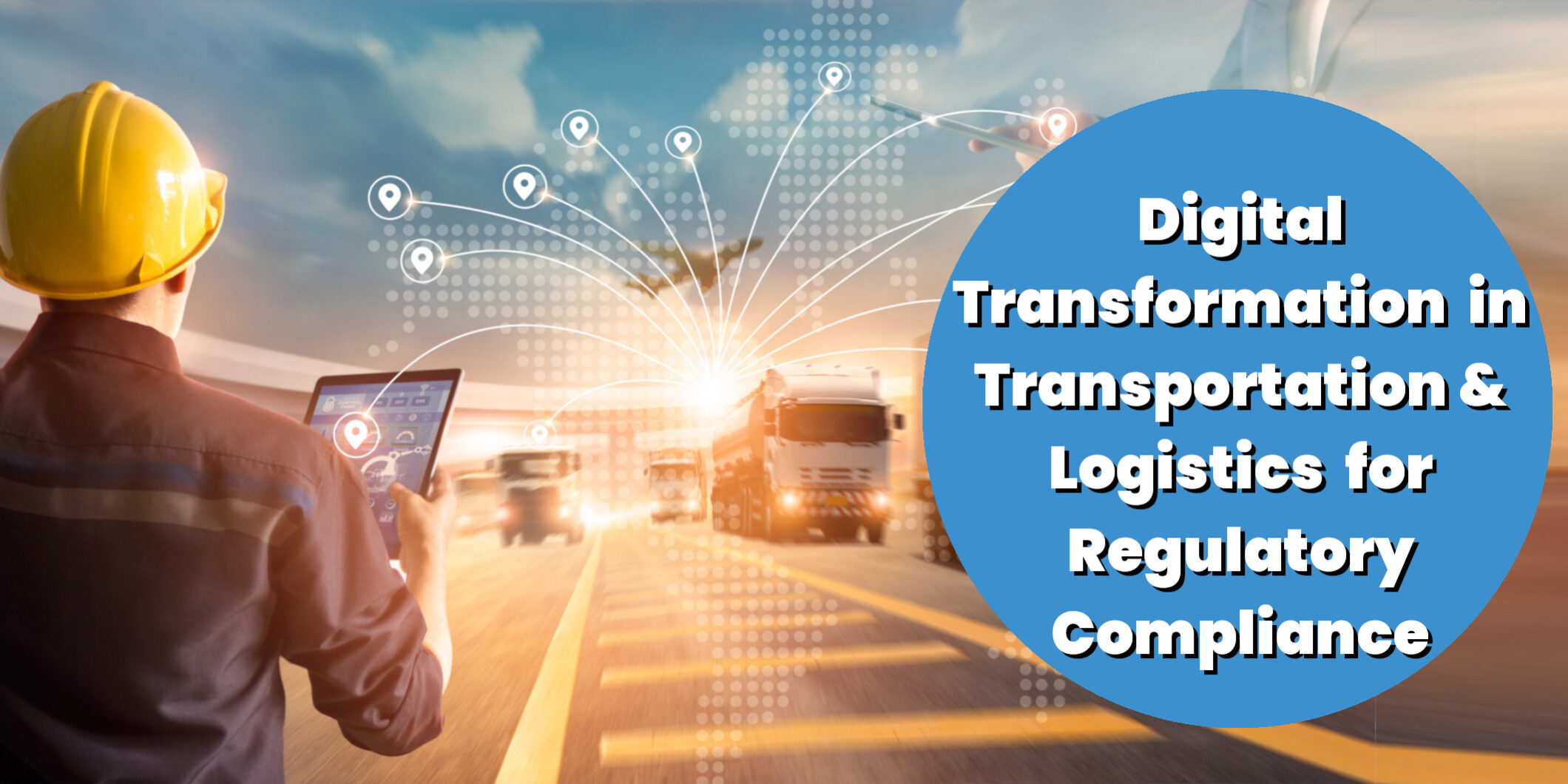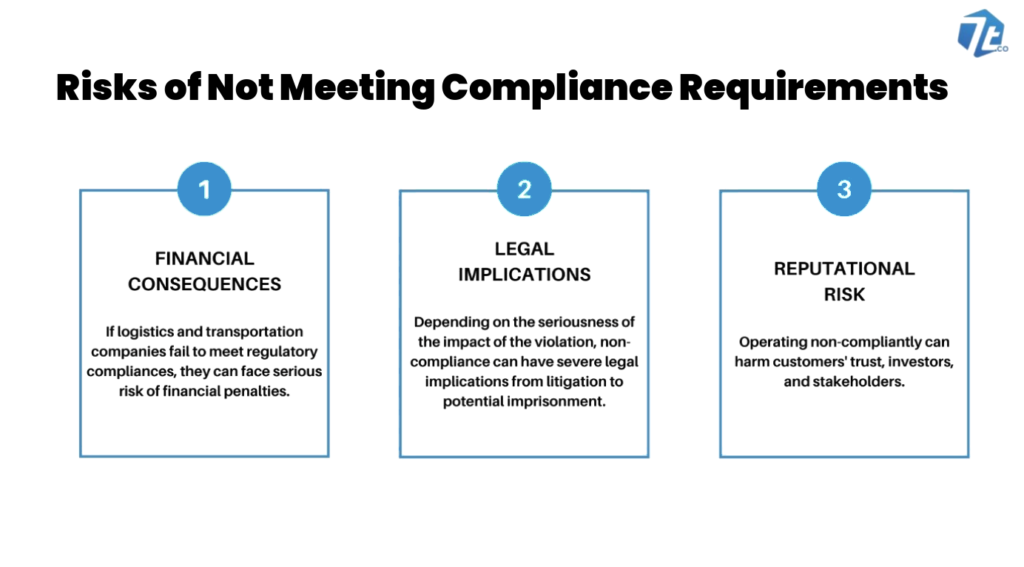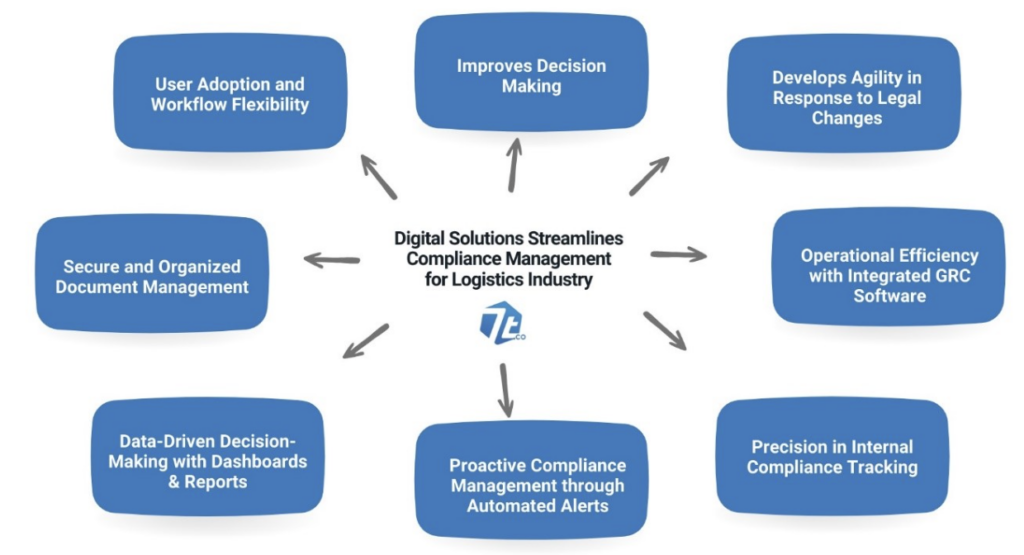The logistics and transportation industry plays the most crucial role in facilitating the movement of commodities from manufacturers or suppliers to consumers across vast distances. To explain its importance more clearly, the logistics and transportation industry is the backbone of worldwide trade and commerce. In the next two years, the logistics sector is expected to grow to $380 billion, accounting for 14.4% of the nation’s GDP. However, logistics costs are 16% of GDP, much higher than the 8% global average. More than 22 million people work in the sector. However, more than 90% of it needs to be more organized.
On the other hand, as the world is changing into a more connected place, the complexity of logistical operations is becoming more complex. In the middle of this complexity, ensuring regulatory compliance has become a critical parameter to guarantee effective and efficient logistical operations.
Logistics companies must adhere to several regulatory compliances mandated by government authorities, such as the General Safety Regulations, the Federal Motor Carriers Safety Administration (FMCSA), and the Department of Transportation (DoT). This includes license regulations for commercial drivers, maintenance, Hours of Service (HoS), Electronic Logging Devices (ELDs), and other components.
Making a mistake or missing out on meeting any of the mandated compliances can result in a big problem for a logistics company. It could affect the company’s financial performance, hamper its brand reputation, and hinder future growth.
To understand the severity of non-compliant logistical operations, take into account these statistics: As per the survey conducted in 2012, it was found that 83% of logistics firms missed at least one critical compliance, and 91% paid fines.
In short, the risk of not meeting regulatory compliance is significant. Let’s determine the consequences logistics businesses face when they fail to ensure compliant operations.
The Risks of Non-Compliance
Financial Consequences – If logistics and transportation companies fail to meet regulatory compliances, they can face serious risk of financial penalties, which can pose a significant threat to the company’s revenue and overall bottom line. For instance, as per the FMCSA 2023 report, there were 5,811 cases of violation of DoT requirements. Violating this regulation could result in paying a fine of 1,388 US Dollars daily and $13,885 US Dollars in total. Managing the potential consequences of such penalties is a massive challenge for many logistics and transportation businesses.
Legal Implications – Depending on the seriousness of the impact of the violation, non-compliance can have severe legal implications for business owners. It can be from serious litigation to potential imprisonment. Government regulatory authorities can execute investigations, charge penalties, and even revoke business licenses or permits. Additionally, legal proceedings are time-consuming, which takes away valuable time and resources from essential business operations. Above all, it is important to remember that the legal landscape is dynamic, constantly emerging new regulations or updates to existing ones, exposing non-compliant companies to ongoing legal liabilities.
Reputational Risk – Non-compliance can also put logistic business owners in danger of damaging their brand reputation. Operating non-compliantly can harm customers’ trust, investors, and stakeholders. This, in turn, can decrease sales and, thus, the company’s revenues. Even if a business is ultimately found to be compliant, undergoing an investigation can negatively impact its brand reputation.
As a result, maintaining a proactive approach to meeting compliance is essential for safeguarding financial and reputational interests in the dynamic logistics industry. Did you know – that embracing technology that offers business process automation makes it easy to ensure compliant operations? Yes, you read it right!
Digital Compliance: The Solution to Ensure Safety and Security
As the logistics and transportation company owner, adopting digital solutions to meet compliance requirements is easy and accurate. Using the power of digital transformation, managing mandated regulations becomes simple, helping companies offer efficient, reliable, and secure services.
Now, let us discover how implementing modern digital tools can streamline meeting regulations and requirements and contribute to the company’s success:
Now, let us discover how implementing modern digital tools can streamline meeting regulations and requirements and contribute to the company’s success:
Improve Decision Making
Digital solutions help business owners with detailed compliance checklists and automate the validation process. Through this process, the owner can make strategic decisions based on the validation results and ensure consistent adherence to Central and State regulations, minimizing legal risks. Consequently, it allows organizations to operate proactively.
Develop Agility in Response to Legal Changes
Staying current with the existing, emerging, and updating legal compliances is a MUST for a business to remain successful. To meet the requirement, digital solutions empower business owners with extensive legal databases and real-time notifications to help companies act promptly and make timely decisions to minimize disruption.
Operational Efficiency With Integrated GRC Software
Managing contracts, audit data, litigations, and compliance with one unified digital system is advisable to streamline business operations. Businesses can meet the requirements with integrated Governance, Risk, and Compliance (GRC) software. Implementing digital solutions fosters a robust collaborative work environment and enhances efficiency by building a more cohesive organizational approach.
Improve Precision in Internal Compliance Tracking
Digital solutions offer a comprehensive tracking system that makes compliance monitoring effortless. With custom-made tracking features, digital solutions help logistics businesses align with the industry’s best operational practices. This ensures business operations adhere to compliance, ISO checklist, and other SOPs.
Proactive Compliance Management Through Automated Alerts
Automated alerts and triggers built into digital solutions nurture a proactive, compliant culture. Timely notification for meeting audits and compliance deadlines lets business owners stay informed and take bold actions.
Data-Driven Decision-Making with Dashboards and Reports
AI business and machine learning digital solutions with built-in dynamic dashboards and comprehensive reporting capabilities help business owners gain a competitive advantage. Offering a comprehensive and holistic view of organizations’ compliance status, such tools promote data-driven decision-making and improve overall effectiveness.
Secure and Organized Document Management
Adopting digital transformation, logistics business owners can avail of a centralized repository for all critical documents. Together with keeping all the documents safe and secure, such tools have the potential to track changes made, promoting accuracy and accountability in managing documents. This minimizes the risk of unauthorized intrusions.
User Adoption and Workflow Flexibility
Digital solutions with user-friendly interfaces make it easy for all the employees in the business to adopt compliance practices. The responsive features and contemporary design provide seamless cross-platform navigation for users, enhancing organizational workflow flexibility and efficiency.
The logistic and transport company owner can be assured that comprehensive compliance solutions ensure regulatory adherence and contribute to a strategic, efficient, and collaborative business environment. This positions the organization for sustained success in a dynamic marketplace.
7T’s Expertise in Developing Logistics Software That Meets Regulatory Compliance Requirements
At 7T, we have over a decade of proven experience and deep domain expertise. Our digital transformation services help logistics companies with modern digital solutions, offering business process automation, real-time data access, and quick yet accurate data analytics capabilities. This, in turn, helps companies improve performance and achieve end-to-end service delivery excellence.
-
-
- With custom-made enterprise solutions and mobile app development, we help logistics companies:
- Guarantee adherence to industry regulations, ensure compliance and minimize risks.
- Streamline document management and reduce administrative workload in logistics operations.
- Boost operational efficiency through end-to-end digitization, minimizing errors for a smoother logistics experience.
- Elevate global CSA scores by prioritizing safety with advanced management systems, ensuring a secure transportation network.
- Access region-specific services for full regulatory compliance worldwide, navigating diverse environments effortlessly with comprehensive solutions.
-
Finding the Best Digital Transformation Development Partner
At 7T, we specialize in Digital Transformation development for the transportation and logistics industry and beyond. The Digital Transformation development team here at 7T is guided by the approach of “Digital Transformation Driven by Business Strategy.” As such, the 7T development team works with company leaders who are seeking to solve problems and drive ROI through Digital Transformation and innovative business solutions such as multimodal machine learning-powered AI implementations in the transportation and logistics business space.
7T has offices in Dallas, Houston, and Austin, but our clientele spans the globe. If you’re ready to learn more about Digital Transformation development solutions, contact 7T today.












